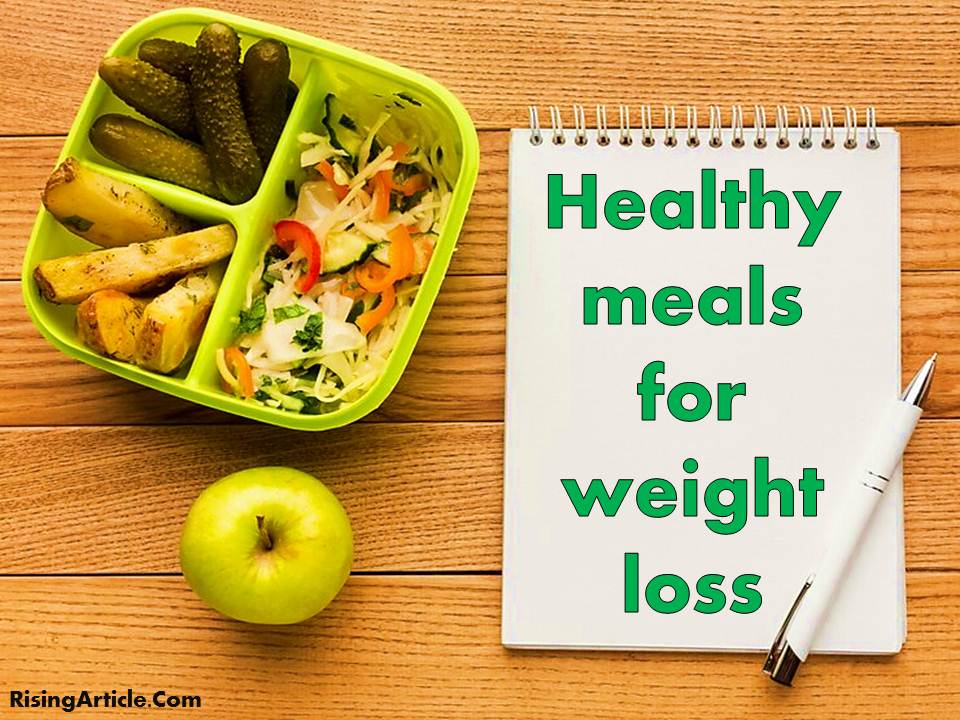The importance of “Healthy Meals for Weight Loss” cannot be emphasized in a society where the desire to lose weight and lead a healthier lifestyle have become top priorities. An increasing number of people are looking for long-term, practical solutions to reach their weight loss objectives as the battle of the bulge continues. This journey often starts in the kitchen, where the decisions we make about what to eat determine whether or not we succeed in becoming a healthier, happier, and more self-assured version of ourselves.
In this article of “Healthy Meals for Weight Loss ideas,” we will delve into the world of wholesome, fulfilling, and delicious recipes that nourish the body and mind in addition to aiding in weight loss, giving you the power to take control of your wellness path. These pages contain information and insights that will serve as your guide on an exciting culinary journey, regardless of whether you’re starting a weight loss journey for the first time or just trying to maintain a healthy, balanced diet. So get ready to go on a voyage of flavor, discovery, and metamorphosis as we reveal the techniques for creating wholesome, delectable meals that will help you lose weight.
Healthy meals for weight loss
 There are satiating and nourishing healthy meal options that can help you lose those excess pounds. These are the goals you ought to pursue:
There are satiating and nourishing healthy meal options that can help you lose those excess pounds. These are the goals you ought to pursue:
The maintenance of muscle mass and feelings of fullness that come from eating lean protein sources are critical for weight loss because they boost your metabolism. Lean beef, fish, beans, lentils, tofu, and tempeh are among the options, as well as skinless chicken. When preparing meals, try to incorporate some protein to help maintain lean body mass and reduce appetite.
Complex carbohydrates and fiber found in whole grains contribute to stable energy levels and a feeling of fullness. Oats, brown rice, quinoa, and whole wheat pasta are a few examples. To cut down on empty calories, whenever feasible, replace refined grains with whole grains.
Vegetables and fruits are high in fiber, vitamins, and minerals and low in calories. Fiber keeps you feeling full and helps regulate your appetite. Choose a variety of colors for your fruits and vegetables to ensure a wide range of nutrients. Make up half of your plate with them.
Nutrient-dense and satiating between meals, healthy fats like those in avocados, nuts, seeds, and olive oil can help you feel full. They’re crucial for general health as well. However, keep in mind that portions are high in calories.
Portion control is essential for weight loss even when eating healthful foods. Use smaller bowls, plates, and utensils to help you keep your portion sizes under control because it’s easy to overeat. Pay attention to your body’s signals of hunger and fullness to prevent overindulging.
Maintaining adequate hydration is crucial for weight loss. We can confuse thirst for hunger on occasion. By sipping water or herbal tea, you can help yourself refrain from mindless snacking. Try to drink at least 8 cups (64 ounces) of water each day, though this can change based on the weather and your level of activity.
Meals that are balanced include fats, carbs, and protein. This equilibrium lessens the desire to snack on unhealthy foods by preventing energy crashes and helping to maintain stable blood sugar levels. For example, grilled chicken (protein), brown rice (carbohydrates), and steamed broccoli (fiber and vitamins) on the side could make up a balanced dinner.
Snacking healthily can help stop overindulging during meals. Yogurt with a handful of mixed nuts or sliced vegetables paired with hummus make great choices. Stay away from highly processed or sugary snacks as they frequently cause energy spikes and crashes.
Fast food, sugar-filled drinks, and packaged snacks are examples of highly processed foods that are frequently low in nutrients and high in calories. Reduce their presence in your diet as they may undermine your attempts to lose weight.
Making healthier decisions can be aided by preparing your meals and snacks ahead of time. It lessens the possibility that, in hurry and when you’re hungry, you’ll order takeout or choose unhealthy options.
Remember that there isn’t a single strategy for losing weight that works for everybody. It’s a good idea to work with a registered dietitian or nutritionist to create a personalized plan that fits your lifestyle and supports you in reaching your weight loss goals in a sustainable manner, as every individual has different needs and preferences. In addition to monitoring your progress and offering guidance, they can make necessary adjustments.
Benefit of Healthy meals for weight loss
 In terms of weight loss, eating well can provide a number of significant advantages.
In terms of weight loss, eating well can provide a number of significant advantages.
Meals that are healthier typically have less calories than those that are not. For weight loss purposes, this implies that you can consume more food while feeling full and maintaining your daily calorie intake.
Meals high in nutrients can aid in the regulation of hormones that affect feelings of fullness and appetite. Controlling your appetite and selecting healthier foods may become simpler as a result.
Nutrient-dense foods like fiber, vitamins, and minerals are packed with essentials. You feel fuller and less inclined to snack on foods high in empty calories when you do this in addition to providing your body with nourishment.
Your body can more easily burn calories and lose weight if you eat certain healthful foods that increase metabolism.
Proteins and fiber, which make you feel full and content, are frequently found in healthy meals. As a result, there is less chance of overindulging or unhealthy snacking.
In the long run, eating well can be sustained. Although severe restrictions and crash diets frequently cause yo-yo weight fluctuations, a balanced, healthful diet can be sustained over time.
Losing weight has health benefits in addition to aesthetic ones. The risk of developing chronic illnesses like diabetes, heart disease, and some types of cancer can be decreased by eating a healthy diet.
A consistent supply of energy is provided throughout the day by well-balanced, healthful meals. The spikes in energy and cravings that can cause overindulgence won’t happen to you.
Maintaining lean muscle mass while losing fat is more likely to happen when you prioritize eating healthily, This matters because even when at rest, muscle burns more calories than fat.
It’s easier to stay motivated and make wise decisions when you eat a healthy diet because it can lift your spirits and increase mental clarity.
In conclusion, eat fewer calories, feel fuller for longer, and maintain a diet rich in nutrients when you eat healthily. These factors all contribute to weight loss. Taking this approach helps you lose weight and improves your general health as well.
How to make healthy meals more satisfying
Portion size, taste, and texture are just a few of the components that work together to make healthy meals more fulfilling. The following advice can assist you in increasing the satisfaction of your nutritious meals:
Include protein to feel fuller.
Add flavorful healthy fats.
Engage in mindful dining.
Take your time when eating.
Hold your water.
Pay attention to serving sizes.
Provide a range of textures.
Make a balanced meal plan.
Select foods high in fiber.
Make use of aromatic spices.
Macronutrient balance.
Eat often and in smaller portions.
Refrain from processed foods.
Never miss a meal.
Treats are fine in moderation.
Remain active to control your appetite.
Keep in mind that each person has unique dietary requirements and preferences, so it’s critical to determine what suits your needs and way of life. Try varying the ingredients, cooking methods, and meal preparation techniques to enhance the taste and enjoyment of your nutritious meals.
Conclusion:
One cannot stress the value of eating well-balanced meals when trying to lose weight. It is an essential component of any weight-loss plan that works. A dedication to selecting wholesome foods is necessary on the path to reaching and sustaining a healthy weight. A sustainable and successful weight loss plan can be made by individuals by emphasizing whole, unprocessed foods, adding a balanced mix of macronutrients, and controlling portion sizes.
Furthermore, sticking to a diet high in whole, nutrient-dense foods has advantages that go far beyond helping you lose weight. A diet like this can lower the risk of chronic diseases, increase mental clarity, increase energy levels, and improve general well-being. It’s a way of living that promotes people’s long-term health and quality of life in addition to helping them achieve their weight goals.
It’s critical to keep in mind that losing weight is a journey rather than a destination. Maintaining a healthy diet is a lifetime commitment, and each person needs to find their own balance. It is advisable to seek advice from a registered dietitian or healthcare professional in order to develop a customized plan that suits an individual’s needs and objectives. Anyone can start a successful weight loss journey and reap the many benefits of a healthier, more energetic life with commitment, patience, and an emphasis on body nourishment.




